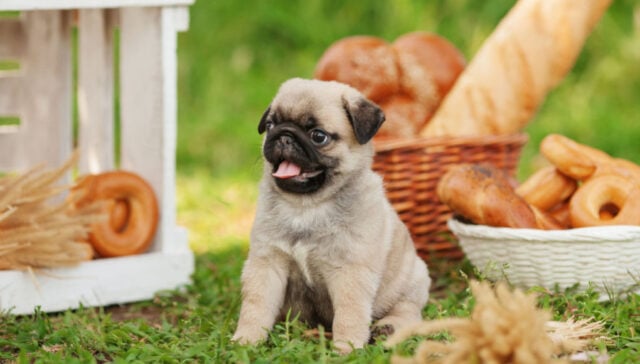
Table of Contents
- Can Dogs Eat Bread?
- How Do I Give My Dog Bread?
- Can My Dog Eat Raw Bread Dough?
- Can Puppies Eat Bread?
- Is Bread Good for Dogs?
- Does Bread Help Dogs With an Upset Stomach?
- How Much Bread Can Dogs Safely Eat?
- What Kinds of Bread Can Dogs Eat?
- Can dogs eat white bread?
- Can dogs eat rye bread?
- Can dogs eat bread crusts?
- Can dogs eat wholemeal bread?
- Can dogs eat seeded bread?
- Can dogs eat toast?
- Can dogs eat bread with butter?
- Can dogs eat garlic bread?
- Can dogs eat sourdough bread?
- Can dogs eat banana bread?
- Can dogs eat multigrain bread?
- Can dogs eat pita bread?
- Can dogs eat raisin bread?
- Can dogs eat cornbread?
- Can dogs eat pumpernickel bread?
- Can Dogs Eat Bread: FAQs
- Can Dogs Eat Bread: Takeaways
Can dogs eat bread? I think my pup got a taste of it.
We are ‘breadaholics,’ aren’t we? Well, most humans love bread!
Besides being scrumptious, we can simply eat them with our hands.
Sometimes we spread it with butter, chocolate, and jam. We also use those sliced bread loaves to make our own version of sandwiches!
Since a loaf of bread is a household staple, sometimes we wonder if we can share a piece with our four-legged companions.
Well, you've come to the right place if you're looking for facts on whether dogs can eat this soft and fluffy treat!
Can Dogs Eat Bread?
Yes, just like us, your dog can safely eat bread in moderation.
Unless it has an underlying intolerance to wheat, your handmade bread is safe for your four-legged friend.
Despite this being the case, we're not saying it's the healthiest snack!
Nutrients are lacking, yet sugar, especially processed sugar, is abundant.
In addition, there are many bread varieties that your pooch should avoid.
These have ingredients that have a reputation for being hazardous to our dogs.
Giving Fido the incorrect variety might lead to health issues, mostly digestive issues like diarrhea and vomiting.
If your pawed buddy eats too much, bread poisoning can also harm the liver.
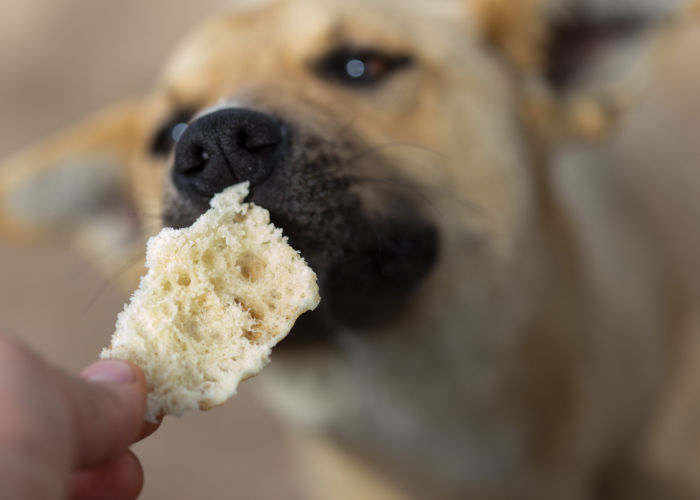
How Do I Give My Dog Bread?
As long as you provide your dog with a balanced and healthy raw diet, giving them bread as a treat occasionally won't harm them.
Remember that your dog's diet shouldn't contain more than 10% of treats.
Until you come up with a better formula, you can use bread as a filler food.
For instance, your canine friend has recently been starving all the time. You observe him gobbling up his dinner and begging for more.
Before eating his meal, you can fill his stomach by giving him some bread.
In fact, some manufacturers add wheat to their dry dog food as a filler component.
Most dogs can tolerate gluten without any issues. However, like us, they are susceptible to allergies to specific forms of gluten.
Here are some pointers for feeding bread to your dog:
- Use a new loaf of bread, not stale bread.
- You shouldn't feed fried bread to your dog.
- Don't overfeed your dog bread as it can irritate their stomach.
- Ensure the bread you serve Fido is low in salt and prepared specifically for dogs.
Important: Serve it plain. Avoid putting your favorite spreads (such as jam, Nutella, etc.) that contain too much sugar or spices.
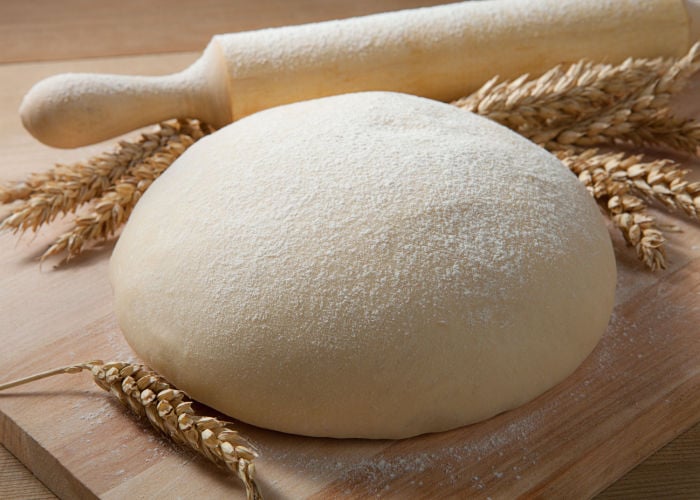
Can My Dog Eat Raw Bread Dough?
I usually make my bread from scratch. How about bread dough for my dog?
Well, handmade bread with a fresh crust is unbeatable.
But if you prepare it from scratch, keep your furry buddy away from the bread dough.
The Merck Veterinary Manual lists bread dough as a food toxic for our dogs.
Fido may be able to eat the finished product without any harm, but raw bread dough can be fatal.
Note that the dough will continue to rise because active yeast is present.
As a result, this may cause your dog's stomach to expand, causing bloating and making breathing difficult.
At the same time, the yeast in the bread dough might cause alcohol poisoning in your dog by releasing ethanol into the bloodstream.
The onset of symptoms, which might happen 30 to 60 minutes after consumption, calls for immediate vet care.
If Fido’s ethanol level continues to rise, cardiac arrest could happen and be fatal.
AKC says you should watch out for these alcohol toxicosis symptoms:
- Seizures
- Weakness
- Depression
- Hypothermia
- Unsteady, drunken gait
- Depressed central nervous system
Can Puppies Eat Bread?
Puppies can occasionally, and in moderation, eat tiny amounts of bread.
Technically, depending on the kind, your puppies can consume bread like adult dogs.
However, we advise giving your pooch some crunchy low-calorie dog treats as opposed to bread.
Snacks such as pieces of apples and carrots or green beans can be nutritious.
Plus, the kitchen pantry in your home nearly always has these on hand.
Bread isn't the healthiest food for them because, as was previously noted, it has little to no nutritional value.
Relevant Read: Recipe: Carob Crunchies Dog Treats (Wheat and Gluten Free)
Is Bread Good for Dogs?
Are there even benefits of feeding my dog bread?
To be fair, bread can have some benefits for your dog.
It reduces pain
Your dog may feel better after eating a small piece of bread if they are experiencing a slight gastrointestinal ache.
Although white bread is preferable, brown bread also includes nutrients that help Fido's tummy feel better.
It supplies energy
Bread is a great source of sugar and carbohydrates, which your four-legged friend needs for endurance.
Your dog's tummy will digest the carbs and convert them to glucose for energy.
It relieves constipation
Dietary fiber, which is abundant in whole-grain bread, can benefit your dog's digestion.
Fido's stool gains volume and binds with water, making it simpler to pass and easing constipation.
Relevant Read: Top 7 Best Grain-Free Dog Treats
It can help in emergency situations
Your dog can sometimes swallow foreign objects like sticks, fragments of bone, or thread, which can result in intestinal obstruction and pain.
Giving your dog a few slices of bread can help bind or cushion any things your dog may swallow, allowing them to flow naturally through the digestive system.
Related: What To Do If Your Dog Swallows Something He Shouldn't
Does Bread Help Dogs With an Upset Stomach?
When Fido has an upset stomach, a small piece of white bread can provide some relief.
Bread contains a lot of carbs, which absorb the ascorbic acid causing your dog's discomfort.
It just takes a quarter of a regular slice to alleviate the symptoms, but you should consult your vet for advice on serving sizes.
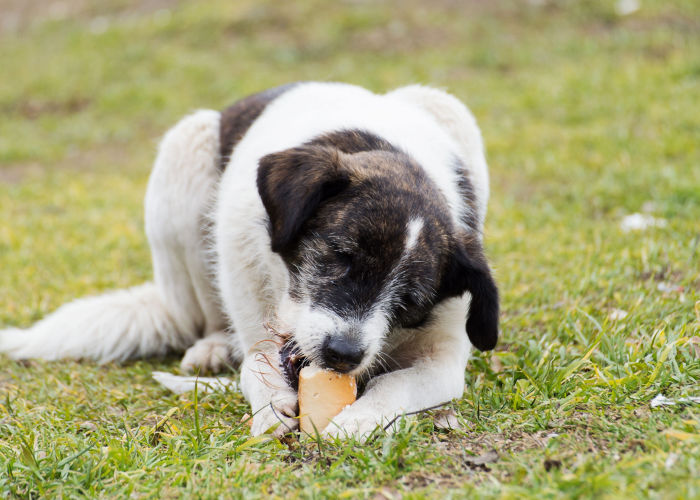
How Much Bread Can Dogs Safely Eat?
Dr. Laura Robinson advises you shouldn’t give more than a few bites.
According to her, bread can cause weight gain if you feed your pooch often.
This is because bread contains a lot of sugars, fats, and carbs, which can make dogs overweight when consumed in large quantities.
Diabetes, pancreatitis, and joint issues are just a few of the additional health problems that may arise.
Depending on the type, a piece of bread has 100 calories on average. It's advisable to consider Fido's size and portion correctly.
As such, larger dogs, such as Siberian Huskies, Golden Retrievers, or Great Danes, can consume more bread than smaller canines, such as Poodles, Havanese, or Maltese.
To be sure you're giving your dog the right treats to complement its daily caloric intake, use the table below as a guide.
| Dog’s Weight | Total Calories/day – including treats | Allowed Calories of all Treats/day (5%) |
| 10 lbs | 200-275 | 10-14 |
| 20 lbs | 325-400 | 16-20 |
| 30 lbs | 500-575 | 25-29 |
| 50 lbs | 700-900 | 35-45 |
| 70 lbs | 900-1050 | 45-53 |
| 90 lbs | 1100-1350 | 55-68 |
Related: Let's Talk: How Many Calories A Dog Needs Per Day?
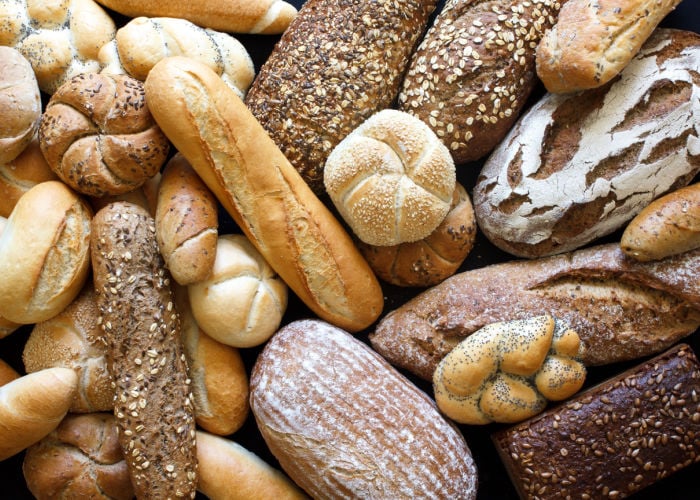
What Kinds of Bread Can Dogs Eat?
Our dogs' digestive systems can process carbs. Therefore, most dogs can consume the bread.
The sole exception, though, is if your canine friend has a wheat allergy.
Itching, hot patches, a dull coat, and dry skin are just a few skin and coat issues that can result from wheat intolerance.
If your dog exhibits these signs, consult a vet to have your dog formally diagnosed with a wheat allergy or to rule it out.
Fortunately, my dog is not allergic to wheat. What type of bread is okay to give him?
Well, did you know that bread is among the most often consumed foods worldwide?
Bread comes in at least 100 different varieties and is available all across the world.
That’s why the sight of a loaf of bread on your dining table is something not unusual.
Not also a surprise that some fur parents wonder,
“Can dogs eat bread? What kind of bread is safe to feed mine?”
Vets don’t regard most bread as toxic to dogs.
Your dog will only have problems with the ingredients, toppings, and form of the bread.
Relevant Read: 10 Cancer-Causing Ingredients in Dog Foods
Can dogs eat white bread?
As long as they don't have allergies, dogs can eat plain white bread without experiencing any stomach problems.
Additionally, it doesn't contain any hazardous ingredients for your dog.
However, remember it has little nutritional value, so just provide small quantities.
Can dogs eat rye bread?
Small pieces of plain rye bread are a treat that dogs occasionally enjoy. Using rye flour, rye bread is a particular type of bread.
It is a thick bread that is frequently used for sandwiches. Fido-friendly nutrients are present, and it is a healthy source of fiber.
Can dogs eat bread crusts?
Although it shouldn't harm them, giving dogs bread crusts shouldn't become a regular habit. Your dog receives no nutritional advantages from it.
Make sure no butter is present in the toasted crusts. There are problems that butter may trigger, such as vomiting or diarrhea.
Can dogs eat wholemeal bread?
Wholemeal bread is not toxic to dogs. Compared to white bread and multigrain bread, it actually has considerably better health benefits.
It has a low glycemic index, calorie, and carb content. Your dog may consume it in moderation on occasion, though.
Can dogs eat seeded bread?
Dogs cannot consume bread with added ingredients like seeds, chocolate chips, or nuts.
The reason why your dog can’t eat seeded bread is that while many seeds aren't technically harmful to your dog, they aren’t easily digested.
Related: The Ultimate List of Toxic and Safe Plants, Seeds for Dogs
Can dogs eat toast?
Again, if your dog doesn't have any allergies, they can have toast in moderation.
Plus, most pups find a little crunchy crust to be a tasty treat.
Although it's unlikely to hurt your four-legged pet when they eat toast, it also won't keep them healthy.
Can dogs eat bread with butter?
We don’t recommend feeding your dog buttered bread. Butter contains a lot of fat and is not a very healthy food to consume frequently.
Additionally, it gives your dog little access to important nutrients and puts it at risk for obesity and weight growth.
Relevant Read: Dog Gut Microbiome Study: What Causes Obesity in Dogs?
Can dogs eat garlic bread?
If your dog eats a lot of garlic bread, the ingredients can irritate its stomach and be bad for its health—even more if other dog-toxic herbs are included in it.
It could result in severe health issues like vomiting, stomach aches, and diarrhea.
Can dogs eat sourdough bread?
Depending on your dog's size and how much is consumed, sourdough bread might cause stomach bloating. It frequently contains more yeast than other types of bread.
So while you shouldn't give Fido sandwiches for every meal, giving him a piece of plain bread won't harm his health.
Can dogs eat banana bread?
Because banana bread contains a lot of sugar, dogs shouldn't eat it.
Additionally, some banana recipes frequently contain items that are bad for your dog, like chocolate chips, walnuts, or the artificial sweetener xylitol.
Related: Can Dogs Eat Bananas? 7 Potential Benefits and 4 Side Effects
Can dogs eat multigrain bread?
Dogs can eat multigrain bread, but we don't advise it because certain varieties contain nuts and seeds.
Due to their high-fat content, nuts might result in pancreatitis if consumed in big quantities.
Some nuts, such as flavored almonds and cashews, might irritate Fido’s stomach.
Can dogs eat pita bread?
Dogs can eat pita bread as an occasional treat. Although, it’s not nutritious and shouldn’t be a part of their diet.
Fido can consume very small amounts as long as none of the dangerous ingredients we discussed are present.
Can dogs eat raisin bread?
The traces of raisins in products like raisin bread can be hazardous to dogs. It shouldn't be given to them as a treat and should be kept out of reach.
When dogs are exposed to raisins or grape poisoning, gastrointestinal symptoms, including vomiting and diarrhea, are typically the first signs that occur.
Related: Can Dogs Eat Grapes? Grape Toxicosis and Dangers Explained
Can dogs eat cornbread?
It's safe to give dogs tiny amounts of cornbread. Things start to get riskier if additional ingredients are used, such as butter or onions.
It is important to note that just a small amount of cornbread is enough for your furry friend.
Can dogs eat pumpernickel bread?
Certain rye bread types, like pumpernickel bread, contain nuts that are toxic to dogs.
For instance, walnuts and hazelnuts are frequently added ingredients that affect your four-legged friend's immune system.
Can Dogs Eat Bread: FAQs
How much bread can a dog eat?
You shouldn’t give more than a couple of bites. Your four-legged pal should be okay to eat a little piece of plain white bread.
Your dog's risk of obesity may increase with a diet heavy on bread. In diabetic dogs, its high glycemic index might cause blood sugar spikes.
Why can't dogs eat bread?
Bread is a great source of carbohydrates but has no nutritional value for dogs. Therefore, giving your pooch too much bread may result in weight gain.
A balanced diet and quality dog food should provide all the nutrition your canine companion needs.
What bread can dogs not eat?
Avoid bread that includes xylitol, almonds, chocolate, raisins, grapes, onions, and garlic.
White bread and brown bread are both okay for dogs to consume in moderation, but they must always be fully baked (not raw dough).
Can Dogs Eat Bread: Takeaways
Can dogs eat bread?
As a responsible fur parent, you can now decide wisely since you know the answer. If your dog appears to enjoy it, you may give him a small slice as a treat.
If your dog grabs a piece of plain bread—or any bread that is properly baked and free of toxic ingredients—he should be fine!
Avoid slices of bread with nuts, chocolate chips, garlic, or butter. No uncooked cookie dough, either!
Ensure your dog isn't overweight and has no sensitivities to wheat. Otherwise, it’s not safe due to the rich carbs in bread.
Finally, your vet is an ally and may provide you with more insight about which treats are safe and which you should avoid.












